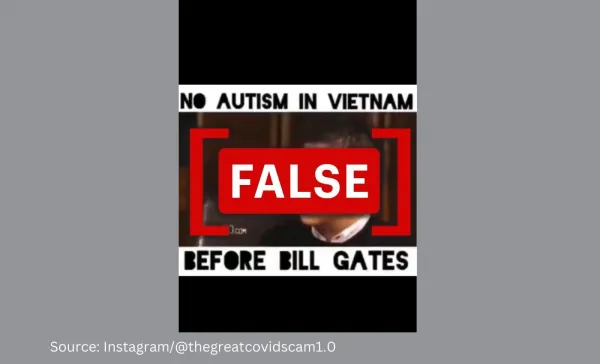By: Arron Williams
August 15 2023

Autism in Vietnam is under-reported, and other countries' research shows no link between vaccines and autism.
Context
In a video, that was also recently shared on Facebook, anti-vaxxer Anthony Phan claims that in Vietnam, “there was no such thing as Autism in 1975, 2000, or 2001.” He further claims that after Bill Gates introduced a vaccination program, there has been a “300 percent rise in Autism” in Vietnam. The caption on the video also reads, “No autism in Vietnam before Bill Gates.”
The clip of Phan is taken from a video interview, “Vaxxed: Stories From The Road,” which is linked to the anti-vax film “Vaxxed: From Cover-Up To Catastrophe,” directed by known anti-vaxxer and discredited former physician Andrew Wakefield. Time Magazine reports that Wakefield pushed claims that vaccines caused autism, but other researchers found no evidence to support his claims, and Wakefield’s license to practice medicine in the U.K. was subsequently revoked in 2010.
In fact
There is no evidence that autism in Vietnam, or any country, is caused by or related to vaccines.
Research on autism rates in Vietnam is limited, and there is no official record of the rate of autism in the country. According to researchers at Hanoi University of Public Health, autism rates among children are increasing. The study, published in 2021, surveyed 42,551 children and found that “the overall autism spectrum disorder (ASD) prevalence in children aged 18 and 30 months is 0.758%, that is, 1 in 132 children,” which is a significantly increasing trend.
Similarly, earlier research from 2019 in the International Journal of Mental Health Systems studied 17,277 children around Hanoi and two northern provinces and found that the prevalence of autism may be increasing in Vietnam, but did not specify a cause. It also states that autism in Vietnam is “under-recognized” and “under-reported,” with no routine screening for autism in the country. While the study does identify an increase in autism among children, it does not suggest that vaccines are the cause.
Furthermore, no scientific research suggests autism in Vietnam is the result of vaccination programs. No reliable data could be found on rates of autism in Vietnam before 2001; however, a lack of data does not mean that autism was, therefore, non-existent. It is likely the case autism was prevalent in Vietnam but not identified or reported, due to a lack of autism screening. A lack of data alone does not suggest autism rates are linked to vaccination; it does not imply causation.
There has, however, been widespread research outside Vietnam into vaccines and autism. A substantial amount of scientific studies show no link between autism and vaccination. According to the CDC, which lists a variety of scientific studies, research has shown no link between vaccines or their ingredients and the development of autism. Furthermore, a 2014 meta-analysis, published in the journal Vaccine, found no evidence that vaccinations are associated with the development of autism across case studies involving over a million children. Scientific research has consistently debunked claims that vaccines cause autism.
Bill Gates and the Gates Foundation have been frequently targeted by conspiracy theorists and anti-vax narratives, with Logically Facts finding several such claims false. There is no evidence that any Gates Foundation vaccines caused autism in Vietnam.
The verdict
Substantial scientific evidence has not found a link between vaccines and autism. Furthermore, there is no evidence that autism was non-existent in Vietnam before the introduction of Bill Gates’ vaccination program. Therefore, we have marked this claim as false.